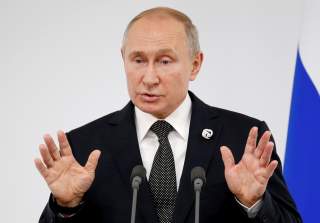Trump-Putin Meeting: Where Does Russia Go from Here?
Moscow is betting that somewhere down the line, Washington will change its mind about Russia. All it has to do is wait.
Moscow lauded last Friday’s meeting between President Donald Trump and Russian President Vladimir Putin in Osaka as a modest victory.
Although top Russian officials acknowledged that little had changed as a result of the meeting, they expressed tempered optimism about the tone of the two leader’s conversation. They are hopeful that if they show patience and manage to keep U.S.-Russian tensions from spiraling out of control, then Washington will eventually accept new détente without Moscow having to alter its course.
In an interview on Sunday, Putin’s press secretary Dmitry Peskov told state television host Vladimir Solovyov that Moscow saw encouraging signs from Trump at the meeting.
“The American president quite distinctly showed his intention to reenergize the dialogue,” he said. “As for Putin, he has long been talking of his desire to go along the path of normalization of relations, but he also said that without mutual interest from the United States we cannot talk about this.”
Peskov added, “Now, for the first time, we have seen this mutual interest from the American president.”
At the same time, other members of Putin’s team admitted that nothing close to a breakthrough occurred. Ambassador Yuri Ushakov, the Russian president’s foreign-policy assistant, said after the meeting “Unfortunately, it was not possible to discuss many topics in depth.”
Trump and Putin reportedly discussed arms-control, trade, Iran, Venezuela, Syria and Ukraine. However, no new agreements or plans for a subsequent meeting between the two leaders were announced.
Despite the lack of concrete results from the Trump-Putin meeting, Moscow does not appear discouraged. Much of the Russian commentary after the meeting emphasized that meetings such as the one in Osaka will sooner or later yield tangible results.
Leonid Kalashnikov, chairman of the Russian State Duma’s Committee for the Commonwealth of Independent States, stated during a discussion on Russian state television, “As a result of some summit, we’ll somehow accomplish something one way or another. There’s no escaping it.”
He added, “[The Americans] roared and yelled after the 1917 revolution, but by 1930 almost all diplomatic ties were restored. They will probably deal with Crimea the same way.”
Professor Dmitry Suslov from the Higher School of Economics expressed a similar perspective to the National Interest prior to the Trump-Putin meeting. He told me that Moscow is confident that if it stays on course, then Washington will at some point come around.
“I don’t think Russia will considerably harden its position; it most certainly will not make any concessions,” he said. “Russia will just wait until the United States will begin to change its policy [towards Russia] by its own initiative for domestic- and foreign-policy reasons.”
Suslov called this approach “strategic patience.”
Earlier this year, Russia’s deputy foreign minister, Sergei Ryabkov, described Moscow’s policy to Washington as “strategic patience” in an interview with Russian foreign-policy monthly International Affairs.
He stated that it was the Americans themselves, “who at one time used the term ‘strategic patience,’ which seems appropriate to describe the line that, it seems, should be pursued in relations with Washington for the foreseeable future,” by Russia.
The term “strategic patience” was commonly used to describe the Obama administration’s approach towards North Korea. Under the policy, Washington would avoid escalating against Pyongyang, but also refrain from making any concessions unless North Korea made the first move.
According to Suslov, Russia’s “strategic patience” approach is based on two assumptions. First, political polarization inside the United States will eventually subside. Once a new domestic consensus emerges in the United States, it will be easier for whoever is in the Oval Office to pursue a normalization of ties with Russia.
Second, the United States will realize over the next five to ten years that it cannot simultaneously confront both China and Russia. Beijing’s growing economic and military power will incentivize the United States to make a play for better relations with Russia.
What does Russia plan on doing until such a shift in Washington’s attitude towards Moscow occurs, assuming it happens at all? Suslov explained that Russia’s primary objective for now is damage control.
“It is essential that we work with the United States to control the conflict and prevent a direct military confrontation,” he said. “To do that, it is critical to meet to discuss questions of strategic stability and regional conflicts.”
In the case of Europe, there are some signs that Moscow’s “strategic patience” game plan is yielding some dividends. Last week, Parliamentary Association of the Council of Europe (PACE) voted to reinstate Russia’s membership without any concessions on the Kremlin’s part. Russia had been suspended from the European human-rights organization after its 2014 annexation of Crimea.
Should allies of newly inaugurated Ukrainian president Volodymyr Zelensky triumph in the country’s parliamentary elections on July 21, the former comedian who ran on the platform of restarting dialogue with Russia may feel emboldened to move in that direction.
As the 2020 election season heats up, Washington is quite unlikely to pursue any significant outreach towards Russia. Both Republicans and Democrats in Congress view the Kremlin with suspicion, and the attitude of the general public is not much more favorable. Nevertheless, Moscow is betting that somewhere down the line, Washington will change its mind about Russia. All it has to do is keep the door open and wait.
Dimitri Alexander Simes is a contributor to the National Interest.
Image: Reuters

